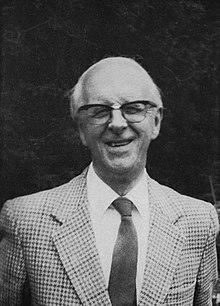CBE F. W. Walbank | |
|---|---|
 | |
| Born | Frank William Walbank 10 December 1909 |
| Died | 23 October 2008 (aged 98) |
| Nationality | British |
| Academic background | |
| Alma mater | Peterhouse, Cambridge |
| Academic work | |
| Discipline | Ancient History |
| Institutions | University of Liverpool |
Frank William Walbank CBE (/ˈwɔːlˌbæŋk/; 10 December 1909 – 23 October 2008) was a scholar of ancient history, particularly the history of Polybius. He was born in Bingley, Yorkshire, and died in Cambridge.
Walbank attended Bradford Grammar School[1] and went on to study Classics at Peterhouse, Cambridge.
From 1951 to 1977, Walbank was Rathbone Professor of Ancient History and Classical Archaeology at the University of Liverpool. After retirement he was a professor emeritus at Liverpool and an Honorary Fellow of Peterhouse.
Walbank held visiting positions at the University of Pittsburgh, the University of California, Berkeley, and the Institute for Advanced Study in Princeton.
Walbank's published works include Aratos of Sicyon (1933), Philip V of Macedon (1940), The Awful Revolution (1946; 1969), Polybius (1972; 1990), A Historical Commentary on Polybius, 3 vols. (1957, 1967, 1979), The Hellenistic World (1981) and, with N.G.L. Hammond, A History of Macedonia, Vol. III: 336–167 BC. He also served as the joint editor of volumes 7 and 8 of the Cambridge Ancient History.
In 1933, Walbank's essay "Aratos of Sicyon" won the Cambridge University Thirlwall Prize. He was elected a foreign member of the Royal Netherlands Academy of Arts and Sciences in 1981.[2]
References
- ^ His Own Executioner, Derek Collett
- ^ "Frank W. Walbank (1909 - 2008)". Royal Netherlands Academy of Arts and Sciences. Archived from the original on 8 June 2020.
Additional sources
- Momigliano, Arnaldo. "F.W. Walbank", The Journal of Roman Studies, Vol. 74. (1984).
External links
- Obituary by Peter Garnsey at the independent.co.uk (23 October 2008).
- Obituary by Robin Seager at the guardian.co.uk (19 November 2008).
- Polybius Man by Mary Beard at The Times Literary Supplement (29 May 2013).